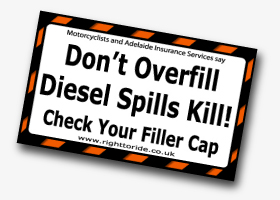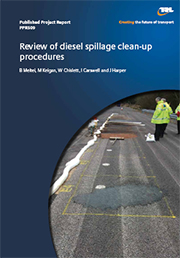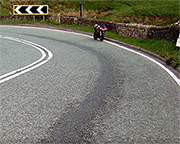15th November 2010
 Right To Ride has learned that the “Review of Diesel Spillage Clean – Up Procedures” study promised by Department for Transport (DfT) in Great Britain has been published. The study primarily focuses on motorcycles and issues surrounding the effectiveness of various diesel spillage products, accident statistics and an estimate of the cost of these accidents.
Right To Ride has learned that the “Review of Diesel Spillage Clean – Up Procedures” study promised by Department for Transport (DfT) in Great Britain has been published. The study primarily focuses on motorcycles and issues surrounding the effectiveness of various diesel spillage products, accident statistics and an estimate of the cost of these accidents.
There is doubt that the publication of this study would not have happened if not for the dedication of “KillSpills” a voluntary group of motorcyclists founded in 2003. This group campaigned relentlessly through demos, events, lobbying, petitions, surveys, public awareness and education for other road users and reports to government.
Of interest to Northern Ireland riders is that the study reviews the reporting of diesel spills in Northern Ireland via the Department of the Environment/Roads Service. Firstly to the Roads Service Direct (RSD) local network maintenance section office, this method of reporting is via the telephone during normal working hours and outside these normal hours via the emergency telephone system.
The study also reports on what type of absorbent material is used in Northern Ireland for treating diesel spillages and the clean up procedure and disposal. The study reports that that there is no clean up procedure in place, but that RSD in conjunction with the Roads Service Network maintenance Sections, are currently drafting a procedure for dealing with spillages on the highway as well as environmental issues of pollution.
The study then goes on to explain how RSD deal with reported spillages, depending on the size of the spillage. However, we have concerns about the method for larger spills of using sand and detergent and “with the action of the vehicle tyres the material is displaced to the verge”, this material is not collected for disposal.
 We say that the RSD could try better so that the “clean up” is not more dangerous to motorcyclists than the actual spillage.
We say that the RSD could try better so that the “clean up” is not more dangerous to motorcyclists than the actual spillage.
Meanwhile back to the study: A KillSpills spokesperson says, “The important thing is that this report confirms what we have been saying since 2003, and I know I can speak on behalf of the whole team when I say we are really pleased with this.” adding “I can see light at the end of the tunnel; our campaign is now really in its final phase”.
Diesel Spills costs! The study looked in-depth at accident and casualty statistics and reviewed accident case studies. It estimated that the total annual value of prevention of the motorcycle accident type where oil and/or diesel was recorded as a special condition at the accident site was £48.91m for the three years: £14.96m in 2006, £18.45m in 2007 and £15.50m in 2008. These relate to the total value to the community of the benefits of prevention of road accidents, apart perhaps for the ongoing physical and mental trauma of riders, which could be prevented in the first place.
Although the study highlights that all motorcycle accidents reported to the police where there was oil or diesel spillage were more likely to be in rural areas. The 2004, “In Depth Study of Motorcycle Accidents” reports that there is “some evidence of a problem” with motorcyclists losing control due to oil, diesel, gravel or mud surface contaminants on rural roads. This latter study indicates that any reported occurrences of this problem have been far outweighed by accidents caused by inappropriate speed or a general lack of experience. However the TRL study has the caveat that the “In Depth Study of Motorcycle Accidents” puts little emphasis on surface contaminates as a cause of accidents and tends to focus on rider and driver behaviour.
Right To Ride’s Trevor Baird says, “We are not sure what the TRL study is trying to suggest regarding accidents caused by spills, because it concludes that the presence of road surface contaminates do present concern for motorcyclists. Through the various sources of information in the study, there are no national guidelines – policies and procedures to deal with hazardous material spillages on highways, but that there is huge cost of millions of pounds to be saved.”
The TRL study is welcomed because it highlights that there are issues regarding spills and motorcyclists as well as treatment products and procedures for reporting spillage incidents.
Killspills is sponsored by the BMF and the IAM. At a recent meeting with the DfT, BMF, IHIE (Institute of Highway Incorporated Engineers) and MAG, their representative stated that a Local Transport Note (LTN) should be issued to all Local Authorities and Emergency Services to advise them of the types of products that should be used to treat diesel / oil spills. He suggested that the note should cover materials that should not be used to clean a spill, e.g. sand and water.
 The DfT are looking into the possibility of issuing the LTN or a Traffic Advisory Leaflet (TAL), KillSpills say “LTNs need to be concise, if it’s more than 6 pages of A4 then you need Ministerial approval, so ours will be at most 6 pages long” There is the possibility that because of cutbacks that if a LTN were to be drafted, outside the DfT, then it’s likely to be approved, but only if it’s in the correct format and language”.
The DfT are looking into the possibility of issuing the LTN or a Traffic Advisory Leaflet (TAL), KillSpills say “LTNs need to be concise, if it’s more than 6 pages of A4 then you need Ministerial approval, so ours will be at most 6 pages long” There is the possibility that because of cutbacks that if a LTN were to be drafted, outside the DfT, then it’s likely to be approved, but only if it’s in the correct format and language”.
However KillSpills do not have the expertise to write a LTN, and they are looking to buy in some consultancy resource to do this for them, but that will depend on raising funds from their sponsors.
Of course prevention is better that cure and drivers, both commercial and private, should remember not to overfill their tanks, to refit the filler cap securely, check any damage to filler cap seals, filler neck fit and consider fitting a retro fit anti spill/anti siphon device.
Remember diesel spills costs, not just in lost of fuel or a fine through “Causing dangerous article to be on road. (Liquid / Solid)” but more importantly spills can and do kill or injure!
Don’t Overfill – Stickers – Poster
Order – “Don’t Overfill” – diesel stickers – Poster Click Here
Notes
KillSpills – www.killspills.org.uk
TRL study the “Review of Diesel Spillage Clean – Up Procedures” – pdf 2.62mb – Click Here
Roads Service
Details of local Roads Service maintenance section offices – Click Here
Roads Sevice report a fault online – Click Here
Fuel For Thought!
From the Highways Agency (GB) for Heavy Good Vehicle operators and drivers – Click Here
Highway Code
Petrol stations/fuel tank/fuel leaks. Ensure that, when filling up your vehicle’s tank or any fuel cans you are carrying, you do not spill fuel on the forecourt. Any spilled fuel should be immediately reported to the petrol station attendant.
Diesel spillage is dangerous to other road users, particularly motorcyclists, as it will significantly reduce the level of grip between the tyres and the road surface. Double-check for fuel leaks and make sure that you do not overfill your fuel tank
- the fuel cap is fastened securely
- the seal in the cap is not torn, perished or missing
- there is no visual damage to the cap or the fuel tank.
Emergency fuel caps, if fitted, should form a good seal.
Highway Code – Click Here



Advice from Devon County Council who ran a very successful campaign called “Spiller Killer” for drivers and motorcyclists.
Drivers
If you run a diesel vehicle don’t overfill your tank and remember to replace your fuel cap properly – it’s money down the drain and bikers on the tarmac if you don’t.
Ensure your vehicle is well serviced. If you see a problem, get it fixed immediately before it causes problems to others.
As well as causing hazards on the road, diesel also corrodes the bitumen road surface causing longer term safety problems.
If you drop diesel on the highway you could be recharged with the cost of repairing the damage.
Early reporting is essential. The earlier they are reported, the sooner they can be dealt with.
If you are responsible for diesel vehicles in your work, or think that your fleet, safety or depot manager might be interested in helping to reduce wasteful and dangerous spillages, get in touch with us today.
Motorcyclists
How do you spot a diesel spill?
There are a number of characteristics that allow you to spot diesel spills on the road:
Diesel spills have a rainbow effect in wet conditions
Diesel has a distinctive smell
Diesel spills are slippery underfoot
Click Here
As an ex-transport manager I have a lot of contacts in the haulage business, and I would like some diesel spillage stickers to put in various places around Larne where I live and to give out to transport companies in the town.
Many thanks Sammy.